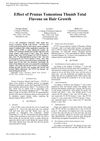 59 citations,
July 2015 in “Journal of innovative optical health sciences/Journal of innovation in optical health science”
59 citations,
July 2015 in “Journal of innovative optical health sciences/Journal of innovation in optical health science” Nanoparticles around 600-700 nm can effectively enter and stay in hair follicles for days, which may help in delivering drugs to specific cells.
 54 citations,
October 2002 in “Journal of controlled release”
54 citations,
October 2002 in “Journal of controlled release” Medium lipophilic substances penetrate skin best, and adding ethanol can increase delivery to hair follicles.
 52 citations,
November 2013 in “European Journal of Pharmaceutical Sciences”
52 citations,
November 2013 in “European Journal of Pharmaceutical Sciences” Chitosan-decorated polymersomes improve finasteride delivery for hair loss treatment.
 39 citations,
September 2016 in “Expert Opinion on Drug Delivery”
39 citations,
September 2016 in “Expert Opinion on Drug Delivery” New drug delivery methods can make natural compounds more effective and stable.
 39 citations,
November 2015 in “Nanomedicine”
39 citations,
November 2015 in “Nanomedicine” Improved Finasteride delivery for hair loss treatment.
 36 citations,
September 2019 in “Journal of Herbal Medicine”
36 citations,
September 2019 in “Journal of Herbal Medicine” Herbal nano-formulations show potential for effective skin delivery but need more research.
 32 citations,
June 2017 in “Journal of Pharmaceutical Sciences”
32 citations,
June 2017 in “Journal of Pharmaceutical Sciences” Chitosan-coated nanoparticles improve skin delivery of hair loss treatments with fewer side effects.
 30 citations,
June 2016 in “European Journal of Pharmaceutical Sciences”
30 citations,
June 2016 in “European Journal of Pharmaceutical Sciences” Optimized film improves finasteride skin absorption and treatment efficiency.
 23 citations,
June 2014 in “Journal of Pharmaceutical Sciences”
23 citations,
June 2014 in “Journal of Pharmaceutical Sciences” Finasteride cream helps hair growth with less side effects.
 15 citations,
March 2013 in “Pharmaceutical nanotechnology”
15 citations,
March 2013 in “Pharmaceutical nanotechnology” Finasteride delivery through skin improved using invasomes and iontophoresis.
 14 citations,
February 2021 in “International Journal of Pharmaceutics”
14 citations,
February 2021 in “International Journal of Pharmaceutics” Deer antler velvet serum helps hair grow and is safe for skin.
 12 citations,
July 2020 in “International Journal of Pharmaceutics”
12 citations,
July 2020 in “International Journal of Pharmaceutics” Iron oxide nanoparticles improve skin penetration and drug release for hair loss treatment.
 11 citations,
May 2010 in “Journal of Medicinal Chemistry”
11 citations,
May 2010 in “Journal of Medicinal Chemistry” A new compound was created in 2010 that can control oil production when applied to the skin, and its effects are completely reversible after two weeks.
 5 citations,
August 2014 in “Pharmaceutical Development and Technology”
5 citations,
August 2014 in “Pharmaceutical Development and Technology” Propylene glycol and ethanol increase finasteride skin absorption, sodium lauryl sulfate doesn't.
 2 citations,
March 2020 in “International Journal of Molecular Sciences”
2 citations,
March 2020 in “International Journal of Molecular Sciences” Topical treatments can deliver active molecules to skin stem cells, potentially helping treat skin and hair disorders, including skin cancers and hair loss.
 December 2023 in “International Journal of Science and Research (IJSR)”
December 2023 in “International Journal of Science and Research (IJSR)” Herbal treatments are effective and preferred for hair loss with fewer side effects.
 June 2015 in “Biomedical and biopharmaceutical research”
June 2015 in “Biomedical and biopharmaceutical research” The congress showed advancements in skin hydration, barrier function, and safe, effective new cosmetic formulations.
222 citations,
January 2003 in “Critical Reviews in Therapeutic Drug Carrier Systems” Ethosomes can safely and effectively deliver various drugs deep into the skin.
12 citations,
May 2013 in “International Journal of Dermatology” Ethosomes improve black tea extract absorption in hair dye.
30 citations,
November 2015 in “Advanced Pharmaceutical Bulletin” Nanoethosomes can improve the skin penetration of Lidocaine for topical use.
 4 citations,
March 2013 in “InTech eBooks”
4 citations,
March 2013 in “InTech eBooks” Confocal Laser Scanning Microscopy (CLSM) is a useful tool for studying how drugs interact with skin and diagnosing skin disorders, despite some limitations.
 January 2025 in “AAPS PharmSciTech”
January 2025 in “AAPS PharmSciTech” Transethosomes improve drug delivery through the skin and show promise for treating various conditions.
 December 2024 in “Pharmaceutics”
December 2024 in “Pharmaceutics” Spironolactone nano-formulations show promise for treating skin disorders, but more research is needed for safety and effectiveness.
April 2024 in “Journal of composites science” Hydrogel composites have great potential in regenerative medicine, tissue engineering, and drug delivery.
 October 2023 in “International Journal of Pharmaceutics”
October 2023 in “International Journal of Pharmaceutics” Using minoxidil with tocopherol acetate in ethosomes improves hair regrowth in hair loss treatment.

Prunus Tomentosa extract is effective in promoting hair growth, similar to minoxidil.
 72 citations,
January 2001 in “Drugs”
72 citations,
January 2001 in “Drugs” Minoxidil and finasteride treat hair loss; more research needed for other options.
 71 citations,
January 2019 in “International journal of biological sciences”
71 citations,
January 2019 in “International journal of biological sciences” Exosomes from dermal papilla cells help hair growth by making hair follicle stem cells multiply and change.
 39 citations,
April 2010 in “International Journal of Pharmaceutics”
39 citations,
April 2010 in “International Journal of Pharmaceutics” Nanoparticles improve minoxidil skin permeation, but more research needed for effective hair growth.
 24 citations,
January 2003 in “Drug Delivery”
24 citations,
January 2003 in “Drug Delivery” Minoxidil-containing vesicles improve hair growth.


























